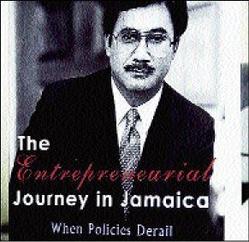Wilberne Persaud, Business Columnist

Persaud
Analysis of failure is important. Without it human progress would be severely compromised. Dr. Chen-Young's focus is not the failure of our indigenous financial sector, rather he claims FINSAC was "total failure".
His letter does not analyse, it simply asserts that FINSAC was a failure. Yet, from its content we can detect his definition and analysis of failure.
First, it is his view that FINSAC was meant to rescue the companies. Having not done so constitutes failure: "There is no doubt in my mind that these companies could have been saved if low-cost funds were lent to them to pay off high-cost funds" - absolutely true, subsidy.
Consider the implications. Insolvent companies borrow money by issuing commercial paper offering clients high interest rates. These persons and companies benefit from funds garnered from insurance company clients through premium payments covering risk or death. Premium-paying clients also paid taxes. Now further tribute must be extracted from them - more taxes to fund government liability undertaken to save the companies.
Indeed FINSAC could simply have created 'paper' undertakings gifted to the companies. Would this have been feasible, fair, or equitable? I doubt ordinary, reasonable, GCT, school fee-paying persons at Half-Way Tree Square would agree. But FINSAC was not created to save the companies. It was created to protect the insured that would have lost all previously committed premium payments without coverage. The insured did not lose coverage.
Entities to foreigners
Second, FINSAC should not have sold entities to foreigners: "Originally hailed as the entity to restructure the financial sector, FINSAC has been a total failure in doing so. All it can show for its efforts is the massive debt to clean up banking and life insurance entities that were then sold at ridiculous terms to Barbadian, Trinidadian and Canadian companies that should have by now recouped their investments and will continue to enjoy high levels of profitability that will adversely impact the country's balance of payments".
June 1996, imagine Jamaica with thousands of pensioners relying on interest from deposits-commercial paper-provided by insurance companies with no means of sustenance. Imagine hundreds of thousands of depositors with life savings in indigenous banks, who from sayJ$10,000 realize only 5 cents per dollar-$500. Could Jamaica's social and economic fabric have survived that eventuality?
We endured two bank runs. They were not pretty! This outcome FINSAC was created to avoid, not to restructure the financial sector as a matter of choice, by whimsical policy shift.
BANK RUNS
Turning to the sale of rehabilitated entities, if a large number of financial entities are to be sold in a short space of time, where are the Jamaican private sector buyers to be found? NCB was placed with the much vaunted Hong Kong and Shanghai Banking Corporation (HSBC) for months with no takers.
When an asset is to be sold and potential buyers know the seller is in difficulty they reduce the offer they are prepared to make. The IMF publicly mandated that NCB was to be sold by a certain date. Given the economic climate, should FINSAC have continued as holding company of the rehabilitated entities managing for five, 10 or 15 years until local buyers could be found?
This would have been really problematic to the private sector and the multilaterals from which we receive support. With our attitudes to government ownership, it would also have been impossible to manage them in the way the private sector could. Depositors, pensioners and holders of insurance policies don't care if a Trinidadian, Canadian, Barbadian or anyother company's nationality owns the enterprise, they want their funds in tact. That has been achieved.
Dr. Chen-Young says "These new owners are risk averse". They will not lend to tourism, agriculture or manufacturing. I doubt these owners turn down sound, profitable business propositions. Does Dr. Chen-Young wish them to make the same mistakes that bankrupted their precursors?
Should they establish in-house companies to own farms, speculate in real estate, coffee, Greenfield tourism sites and the like? Should they move beyond their core competencies to their downfall?
Finally, new legislation and creation of institutions like deposit insurance are certainly successes for financial sector management and regulation. On balance, handling the tasks it was created to undertake FINSAC has been successful. The fact that it accomplished this in so short a time period still surprises some. As I said elsewhere, relatively early and clearly about the meltdown, political affiliation colours people's views on FINSAC. Though regrettable this is perhaps unavoidable in our environment. Yet, to base future financial sector operations upon unsound, erroneous assessments of the crash and responses to it is certainly unwise, perhaps even dangerous.
wilbe65@yahoo.com

Paul Chen Young on the cover of his book 'The Entrepreneurial Journey in Jamaica'. The book details the fall of his financial group, which he blamed largely on misplaced government policies. - File

